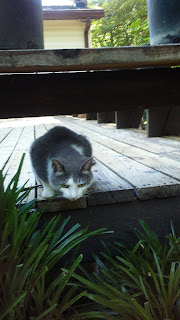I've realized yet another impact this cat has made, an indirect impact, but still, an impact. There have been fewer squirrels in our back yard lately. They have migrated away from our property, at least I would rather think they moved away instead of been eaten as dessert. That cat!
Today I noticed something else cat/squirrel related as I was pulling weeds around our brick patio. Many of the weeds were not really weeds, but tiny trees. So, is a tree a weed? It is, if it is growing amok in a place where it should not be. So I pulled. And pulled more. And more. There were tiny trees everywhere. I had never noticed so many, so I began investigating and connecting dots.
Beside one tiny tree was a clue. Laying next to it was what my children called helicopters, tulip poplar seed pods. In our side yard is a huge tree, and its seeds that spin like helicopter blades were play toys for our neighborhood children. My son and his friends climbed into the tree and dropped them, aiming to hit the top of passing cars. Target practice.
I figured out the connection between the cat, the squirrels and the helicopter, so here goes:
A couple years ago I was preparing a power point presentation for an author visit to fourth graders. I wanted to illustrate word choices I made in writing my picture book, When Christmas Feels Like Home.
To give the reader an image in his mind, I used figurative language to describe the seasons of the year: when pumpkins smile, when trees look like bony fingered skeletons, when words float like clouds from your mouth, when mountains turn the color of the sun...leading up to Christmas, when trees ride on cars.
To illustrate how authors revise, I introduced the children to figurative language I wrote that didn't make it into the final book. One was about those helicopter seed pods: when helicopters spin from trees. In the end I didn't use it because not that many readers would connect the image of a helicopter to seeds spinning from the sky. They had to live in our corner of the world where poplar trees abound and where each new spring season brings the joy of spinning seeds. By the way, the children knew exactly what I was talking about when they saw them. They had spun the seeds themselves.
As part of the power point I wanted to show a picture of the seeds. I went outside my house back then, looking for seed pods to use.
But when I threw them into the sky, they didn't spin. The seeds were missing from the blade and the helicopter pod fell to the ground without spinning. Almost every single one was empty. I had to search to find enough to take that picture to show the children.
But what happened?
Easy answer. Squirrels. They had dined on my tulip poplar seed collection and left the empty hulls behind.
That was pre-cat.
Patches the cat arrived later that year and wreaked havoc with the nature in my backyard. With the squirrel population diminished, the seeds fell undisturbed the next season. Left alone, they sprouted.
Here are a few of the weedy trees I uprooted today, in various stages of germination. I'm talking hundreds of them.
These seeds had two purposes on this earth, beyond entertaining children. Feed for animals and becoming majestic trees. When they avoided being fodder for squirrels, they went on and did their thing and started the miracle process to become trees.
And I pulled them up.
Bummer.
Catch of the day,
Gretchen





Gretchen- this was a great story! You have an easy-to-read style that is quite impressive. I just picked up your book on the Fly Fishermen of Caldwell County this week. I'm a fly tier in Maryland and have started a series recently on the flies of the Great Smoky Mountains. Thanks to you and Ron for putting this book together. You have kept alive some history that would have been lost otherwise. Speaking of that, maybe I'll go leave a review on Amazon. Cheers, Matt.
ReplyDeleteSo great to hear from you! Thank you for letting me know how much you enjoyed the fly fishing book. It was fun to do, and I learned a lot. I tell people this book is not a "How to fly fish" book, but rather a "How they fly fished" book.
DeleteSo great to hear from you! Thank you for letting me know how much you enjoyed the fly fishing book. It was fun to do, and I learned a lot. I tell people this book is not a "How to fly fish" book, but rather a "How they fly fished" book.
Delete